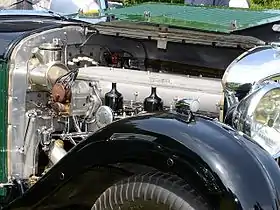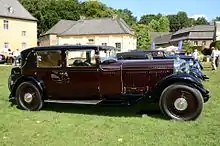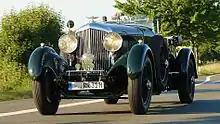Bentley 8 Litre
The Bentley 8 Litre was a large inline-6 cylinder super-luxury car made in various configurations by Bentley Motors Limited at Cricklewood, London. Announced 15 September 1930, it was also the last completely new model by Bentley before the company's financial collapse and forced sale to Rolls-Royce Limited.
| Bentley 8 Litre chassis | |
|---|---|
_(14912429238).jpg.webp) | |
| Overview | |
| Manufacturer | Bentley Motors Limited |
| Production |
|
| Assembly | Cricklewood, London |
| Designer | W. O. Bentley |
| Body and chassis | |
| Class | Luxury car |
| Body style | purchaser to arrange with own coachbuilder[1] |
| Layout | FR layout[2] |
| Related | Bentley 4-Litre (economy version) |
| Powertrain | |
| Engine | SOHC 8 L I6[3] |
| Transmission |
|
| Dimensions | |
| Wheelbase | |
| Length |
|
| Width | 68.5 in (1,740 mm)[2] |
| Height | depending on coachwork |
| Kerb weight | 2.5 tonnes or more, depending on coachwork |
| Bentley 8-litre engine | |
|---|---|
 | |
| Overview | |
| Production | 1930–1932 |
| Layout | |
| Configuration | 6-cylinder in-line |
| Displacement | 7,983 cubic centimetres (487 cu in) |
| Cylinder bore | 110 mm (4.3 in) |
| Piston stroke | 140 mm (5.5 in) |
| Block material | |
| Head material | non-detachable – see block |
| Valvetrain | single overhead camshaft driven by patented triple connecting rods; 4-valves-per-cylinder[3] |
| Compression ratio | 5:1 |
| Combustion | |
| Fuel system |
|
| Fuel type | petrol |
| Cooling system | Water-cooled, with pump, fan and thermostatically-controlled shutters[3] |
| Output | |
| Power output |
|
A Bentley 4 Litre featuring a 4-Litre Inline-6 engine in a shortened chassis was announced on 15 May 1931.
Introduced a year into the Great Depression. the 8-litre and its smaller 4-litre sibling were unable to turn the company's finances around. Less than nine months after the 8-litre's introduction, Bentley Motors was placed into receivership.
Design and specifications
Engine
The straight-six engine used a one-piece iron block and non-detachable cylinder head with a crankcase made from Elektron, a magnesium alloy. It featured an overhead camshaft driven by a Bentley patented "three-throw drive" system of triple connecting rods[4][7] with, like all earlier Bentleys, four valves per cylinder and twin-spark ignition (coil and magneto), which were state-of-the-art at the time.[5][8] The engine had a bore of 110 mm (4.3 in) and a stroke of 140 mm (5.5 in),[3][9] giving a capacity of 7,983 cc (487.2 cu in).[3][10][9] Pistons were of an aluminium alloy.[11]
Both engine and gearbox were mounted each at three points on rubber to isolate the chassis and body from vibration.[11]
Transmission
An entirely new design of four-speed gearbox provided four speeds (constant mesh third) and reverse[3][12] with a single-plate dry clutch which sent power through a hypoid bevel final drive to the rear axle and its 21" Rudge-Whitworth wire centre-lock wheels.[3]
Chassis
The 8 Litre was built on Bentley's largest rolling chassis, a ladder frame with large tubular steel cross-members downswept from the front and rear axles towards the centre to lower the centre of gravity.[3]
Neither engine nor gearbox contributed to the bracing of the chassis.[3]
Suspension by long semi-elliptic leaf springs was controlled by double acting dampers, friction on the front and hydraulic on the rear axle, and all four wheels were fitted with Dewandre vacuum-servo-assisted 400 mm (15.7 in) drum brakes, the forward brakes being of Bentley-Perrott design.[11]
Steering was by worm and sector and castor action could be adjusted to suit individual taste.[3]
There was centralised chassis lubrication[3][13] including the gaitered springs but not for the front axle or the clutch withdrawal system.[3]
The 8-Litre chassis was available with either a 144-inch (3,700 mm) wheelbase or a longer 156-inch (4,000 mm) wheelbase.[3][13] Three were built with a 138-inch (3,500 mm) wheelbase.
The manufacturer claimed a maximum speed of approximately 125 mph (201 km/h).[5] A speed in excess of 105 mph (169 km/h) was guaranteed by the manufacturer.[3]
Reception

Announced on 15 September 1930[4] and launched at the London Olympia Motor Show in October 1930,[3] the 8 Litre Bentley was noted for its tractability and smoothness; it could be driven from walking pace to highway speeds in top gear without effort.[13][9]
As a result of the worldwide Great Depression, the 8 Litre did not sell well enough to improve Bentley's financial situation.[12][9] The chassis was priced at £1,850,[3] roughly equivalent to £293,000 in 2010.[15]
Only 100 of these cars were made,[5][13] of which 35 were on the shorter wheelbase and 65 were on the longer wheelbase.[13] Fewer than 25 were fitted with open bodies. It is suggested that the cost of the development of the car was a prime reason for Bentley Motors going bankrupt.[16]
Bentley made one more attempt at financial recovery by installing modified Ricardo 4-litre engines in a shortened 8-Litre chassis and selling the result as the Bentley 4 Litre.[17][18] Announced on 15 May 1931,[19] only 50 were made before Bentley Motors Ltd. was placed into receivership.[17]
When Rolls-Royce bought Bentley Motors from the receiver[20] in November 1931,[21] it discontinued production of the 8-Litre[13][12] and disposed of all spare parts for it.
Legacy

78 Bentley 8 Litre cars were known to survive as at mid-2011.[22] Many of these have had their original limousine or saloon bodies replaced by new replica tourer bodies.[23] As a result, Bentley 8 Litres with original bodies are much sought after by collectors.
The only Bentley 8 Litre with an American body, which was also the first Bentley with an all-metal body, was built by the W.M. Murphy Company of Pasadena for a customer in Santa Barbara, California.[24]
McKenzie's Garages, a specialist in Rolls-Royce and Bentley cars, modified four 8 Litres in the 1930s: YM5050, with shortened chassis, lowered radiator and bulkhead, and triple SU carburettors,[25] YR5083, with a higher-ratio rear axle and triple SU carburettors,[26] YX5117, with a lowered and shortened chassis and triple SU carburettors,[27] and YX5121, with a shortened and lowered chassis and a tuned engine.[28]
Notes
- History By Chassis – List of all W. O. Bentleys with original chassis nos. 8 Litre
- "Bentley Motors Limited. Display Advertising". The Times (45823). London. 15 May 1931. p. 11.
- "A Great British Car the 8-lire Bentley". The Observer. London UK. 25 January 1931. p. 26.
- "Cars of 1931. (FROM OUR MOTORING CORRESPONDENT). The New Bentley, Silence and Vibration Studied". The Times (45618). London. 15 September 1930. p. 7.
- Ebyl 2001, pp. 192–197.
- RAC Rating
- Brooks 2009, pp. 27, 32.
- Robson 1990, pp. 24, 27.
- Posthumus 1977, p. 115.
- Robson 1990, p. 24.
- "Cars of To-Day. (OUR MOTORING CORRESPONDENT). Eight-litre Bentley". The Times (45691). London. 9 December 1930. p. 19.
- Robson 1990, p. 27.
- Brooks 2009, p. 32.
- "1931 Bentley 8 Litre Chassis No. YF5001 Engine No. YF5001 Registration No. GK 672". Vintage Bentleys .org. Vintage Bentleys .org. Archived from the original on 4 January 2014. Retrieved 4 January 2014.
- Measuring Worth
- 1930→1932 Bentley 8 Litre - Super cats.com(02/03/2020)
- Lot 244: Bentley 4-Litre/8-Litre Le Mans-style Tourer, Motorbase
- HISTORY OF MARQUES: BENTLEY – British, Sportscars.TV
- OUR MOTORING CORRESPONDENT. (15 May 1931). "A New Bentley". The Times (45823). London. p. 13.
- Feast 2004, pp. 64–65.
- King 2008, p. 17.
- Johnson 2011, p. 11.
- Buckley 2004, pp. 42–43.
- 1931 Bentley 8-Liter, Conceptcarz
- Hay, pp. 204–206.
- Hay, p. 128.
- Hay, pp. 231–235.
- 1931 Bentley 8 Litre Chassis No. YX5121 Engine No. YX5122 Registration no. GW 2926, Vintage Bentleys .org
References
- Brooks, Philip C. (2009). Carpenter, Rhonda; Iwalani, Kahikina (eds.). "The Mighty Sixes". The International Club for Rolls-Royce & Bentley Owners Desk Diary 2010. Tampa, FL USA: Faircount: 26–35.
- Buckley, Martin (2004). "2 Exclusivity assured, luxury unlimited". Cars of the Super Rich: The Opulent, the Original and the Outrageous. St. Paul, MN USA: Motorbooks International. pp. 42–43. ISBN 0-7603-1953-7. Retrieved 23 June 2013.
Too many of these fabulous cars have lost their original bodywork in favour of replica open-tourers, but the survival rate of the 8-litre is high. ...Few remaining cars now have original saloon bodywork."
- Eybl, Eckhard (7 March 2001). Ostmann, Bernd (ed.). "Achttausender". Auto, Motor und Sport. 2001 Heft 6: 192–197.
- Feast, Richard (2004). "When Barnato bought Bentley". The DNA of Bentley. St. Paul MN USA: MotorBooks International. pp. 64–65. ISBN 9780760319468. Retrieved 26 March 2012.
- Hay, Clare (2011). Bentley Eight Litre. Number One Press. ISBN 978-0-95358-272-3.
- Johnson, Harvey (Fall 2011). Verschoor, Ron (ed.). "The Eight-Litre: Bentley's Last is Bentley's Best". The Classic Car. Beverley Hills, CA USA: Classic Car Club of America. LIX (3): 3–11. ISSN 0009-8310.
Of the 100 Bentley Eight-Litre models (sic) produced, 78 are known to exist today.
- King, Tom, ed. (2008). "The Derby Bentley Turns 75 Years Old" (PDF). New Zealand Rolls-Royce & Bentley Club Inc. Christchurch, NZ: New Zealand Rolls-Royce & Bentley Club, Inc (8–6): 16–19. Archived from the original (PDF) on 19 April 2014. Retrieved 26 March 2012.
Rolls-Royce Limited bought Bentley Motors through a nominee company on 13 November 1931 for £125,000 and immediately formed Bentley Motors (1931) Ltd.
- Posthumus, Cyril (1977) [1977]. "The End of an Era". The Story of Veteran & Vintage Cars. John Wood, illustrator. Feltham, Middlesex, UK: Hamlyn. pp. 112–123. ISBN 0-600-39155-8.
- Robson, Graham (1990). "Bentley 8-litre". The Worlds Most Powerful Cars. 6 Blundell Street, London N7 9BH: Quintet Publishing. pp. 24–27. ISBN 1-85076-254-6.
The Derby company was relieved when the trade depression killed off Bentley – and the 8-litre model was never revived by the new management.
CS1 maint: location (link) - "1931 Bentley 8-Liter". Conceptcarz. Daniel Vaughan. Retrieved 8 April 2012.
- "1931 Bentley 8 Litre Chassis No. YX5121 Engine No. YX5122 Registration no. GW 2926". VintageBentleys.org. 2006. Archived from the original on 18 July 2012. Retrieved 5 January 2017.
This famous car will forever be associated with just two people: Mr. Forrest Lycett, the original owner, and Mr. L. C. McKenzie, the developer.
- "History By Chassis – List of all W. O. Bentleys with original chassis nos. 8 Litre". Houston, TX USA: VintageBentleys.Org. Archived from the original on 13 April 2009. Retrieved 25 June 2012.
- "HISTORY OF MARQUES: BENTLEY – British". Sportscars.TV. 1966. Archived from the original on 6 August 2010. Retrieved 8 April 2012.
There was nothing to complain about in the engine design, but unfortunately the very heavy 8-litre chassis was used and this resulted in a rather dull and slow car.
- "Lot 244: Bentley 4-Litre/8-Litre Le Mans-style Tourer". Motorbase. Hastings, UK: Classic Vehicles. Retrieved 8 April 2012.
A double-drop chassis was adopted, closely based on that of the contemporary Bentley 8-Litre, and offered in two wheelbase lengths: 11' 2" and 11' 8", both of which were shorter than the shortest of the two 8-Litre chassis available.
| Wikimedia Commons has media related to Bentley 8-Litre. |